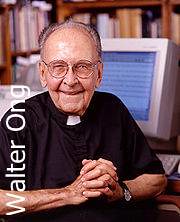Duluth, Minnesota (OpEdNews) October 8, 2021: My favorite scholar is the American Jesuit Renaissance specialist and cultural historian Walter J. Ong (1912-2003; Ph.D. in English, Harvard University, 1955). At Harvard, Perry Miller (1905-1963) served as the director of Ong's massively researched doctoral dissertation about the history of the verbal arts (grammar, rhetoric, and logic or dialectic) up to and beyond the French Renaissance logician and educational reformer and Protestant martyr Peter Ramus (1515-1572).
Perry Millers writes, to the best of his ability, about Ramus in his massively researched 1939 book The New England Mind: The Seventeenth Century (Harvard University Press; for specific page references to Ramus, see the "Index" [page 528]). Briefly, Ramist logic emphasizes either-or thinking as a kind of logical dialect. But Perry Miller also called for a more thorough study of Ramus.
With three graduate degrees under his belt as part of his lengthy Jesuit formation, Ong stepped forward to undertake the more thorough study of Ramus that Perry Miller called for in his 1939 book. In 1958, Harvard University Press published Ong's dissertation, slightly revised, in two volumes:
(1) Ramus, Method, and the Decay of Dialogue: From the Art of Discourse to the Art of Reason (according to Ong, Ramist logic contributed to the emergence of the Age of Reason or the Enlightenment);
(2) Ramus and Talon Inventory (a briefly annotated listing of the more than 750 volumes that Ong had tracked down by Ramus, his allies, and his critics in over 100 libraries in the British Isles and Continental Europe).
Ong characterized his mature work from the early 1950s onward as phenomenological and personalist in cast. Concerning the phenomenological cast of Ong's philosophical thought, see my lengthy OEN article "Walter J. Ong's Philosophical Thought" (dated September 20, 2020):
Now, to put the either/or thinking emphasized in Ramist logic or dialectic in historical perspective, see G. E. R. Lloyd's classic 1966 study Polarity and Analogy: Two Types of Argumentation in Early Greek Thought (Cambridge University Press).
Now, the American Jesuit philosopher and theologian Donald L. Gelpi (1934-2011; Ph.D. in philosophy, Fordham University, 1970) does not happen to advert explicitly to Perry Miller's 1939 book about Ramist logic in seventeenth-century New England, or to Ong's 1958 book about Ramist logic, or to Lloyd's classic study of early Greek argumentation, but Gelpi operationally defines and explains what he refers to as the dialectical imagination of the American Protestant tradition of thought in his 2000 book Varieties of Transcendental Experience: A Study in Constructive Postmodernism (Collegeville, MN: A Michael Glazier Book/ Liturgical Press, pages 82, 132, 164, 172, 174, 192, 193, 206, 223, 224, 280, 281, and 282).
Now, no doubt OEN readers have heard that we in contemporary America are living in polarized time of cultural wars, many of which involve one's personal identity.
On one side of our contemporary polarized culture wars stand Trump's most ardent supporters. The skillful New York Times columnist Thomas B. Edsall writes about them in his column titled "Trump True Believers Have Their Reasons" (dated Oct. 6, 2021):
In his survey, Edsall quotes a paper by Clifford Workman, Keith J. Yoder, and Jean Decety titled "The Dark Side of Morality - Neural Mechanisms Underpinning Moral Convictions and Support for Violence":
"People who bomb family-planning clinics and those who violently oppose war (e.g., the Weathermen's protests of the Vietnam War) may have different sociopolitical ideologies, but both are motivated by deep moral convictions" - and, in my estimate, a strong tendency toward either/or thinking.
(Note: You can view every article as one long page if you sign up as an Advocate Member, or higher).





